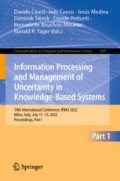Abstract
The classical approach on Formal Concept Analysis (FCA) extracts knowledge from a binary table \(\mathbb {K}=(G,M,I)\) taking into account the existing relationships (given by the binary relation I) between objects G and attributes M. Thus, this classical setting accounts only for positive information. Particularly, FCA allows to define and compute the concept lattice \(\underline{\mathbb {B}}(\mathbb {K})\) from this positive information. As an extension of this framework, some works consider not only this positive information, but also the negative information that is explicit when objects have no relation to specific attributes (denoted by \(\overline{\mathbb {K}}\)). These works, therefore, use the apposition of positive and negative information to compute the mixed concept lattice \(\underline{\mathbb {B}}^{\#}(\mathbb {K})\). In this paper, we propose to establish the relationships between extents and intents of concepts in \(\underline{\mathbb {B}}(\mathbb {K})\), \({\underline{\mathbb {B}}(\overline{\mathbb {K}})}\) and \(\underline{\mathbb {B}}^{\#}(\mathbb {K})\) and how to address an incremental algorithm to compute \(\underline{\mathbb {B}}^{\#}(\mathbb {K})\) merging the knowledge on \(\underline{\mathbb {B}}(\mathbb {K})\), \(\underline{\mathbb {B}}(\overline{\mathbb {K}})\) previously obtained with classical methods.
Partially supported by the Spanish Ministry of Science, Innovation, and Universities (MCIU), State Agency of Research (AEI), Junta de Andalucía (JA), Universidad de Málaga (UMA) and European Regional Development Fund (FEDER) through the projects PGC2018-095869-B-I00 (MCIU/AEI/FEDER), TIN2017-89023-P (MCIU/AEI/FEDER), PRE2018-085199 and UMA2018-FEDERJA-001 (JA/UMA/FEDER).
Access this chapter
Tax calculation will be finalised at checkout
Purchases are for personal use only
References
Cordero, P., Enciso, M., López, D., Mora, A.: A conversational recommender system for diagnosis using fuzzy rules. Expert Syst. Appl. 154, 113449 (2020)
Cordero, P., Enciso, M., Mora, A., Ojeda-Aciego, M., Rossi, C.: Knowledge discovery in social networks by using a logic-based treatment of implications. Knowl. Based Syst. 87, 16–25 (2015)
Cordero, P., Enciso, M., Mora, Á., Ojeda-Aciego, M., Rossi, C.: A formal concept analysis approach to cooperative conversational recommendation. Int. J. Comput. Intell. Syst. 13, 1243–1252 (2020)
Ganter, B., Obiedkov, S.: More expressive variants of exploration. In: Conceptual Exploration, pp. 237–292. Springer, Heidelberg (2016). https://doi.org/10.1007/978-3-662-49291-8_6
Priss, U.: Diagrammatic representation of conceptual structures. In: Braud, A., Buzmakov, A., Hanika, T., Le Ber, F. (eds.) ICFCA 2021. LNCS (LNAI), vol. 12733, pp. 281–289. Springer, Cham (2021). https://doi.org/10.1007/978-3-030-77867-5_19
Gasmi, G., Yahia, S.B., Nguifo, E.M., Bouker, S.: Extraction of association rules based on literalsets. In: Song, I.Y., Eder, J., Nguyen, T.M. (eds.) DaWaK 2007. LNCS, vol. 4654, pp. 293–302. Springer, Heidelberg (2007). https://doi.org/10.1007/978-3-540-74553-2_27
Ibrahim, M.H., Missaoui, R., Vaillancourt, J.: Identifying influential nodes in two-mode data networks using formal concept analysis. IEEE Access 9, 159549–159565 (2021)
Konecny, J.: Attribute implications in L-concept analysis with positive and negative attributes: validity and properties of models. Int. J. Approximate Reasoning 120, 203–215 (2020)
Messaoudi, A., Missaoui, R., Ibrahim, M.-H.: Detecting overlapping communities in two-mode data networks using formal concept analysis. Revue des Nouvelles Technologies de l’Information, Extraction et Gestion des connaissances, RNTI-E-, 35 189–200 2019
Missaoui, R., Nourine, L., Renaud, Y.: Generating positive and negative exact rules using formal concept analysis: problems and solutions. In: Medina, R., Obiedkov, S. (eds.) ICFCA 2008. LNCS (LNAI), vol. 4933, pp. 169–181. Springer, Heidelberg (2008). https://doi.org/10.1007/978-3-540-78137-0_13
Missaoui, R., Nourine, L., Renaud, Y.: Computing implications with negation from a formal context. Fund. Inform. 115(4), 357–375 (2012)
Rodríguez-Jiménez, J.M., Cordero, P., Enciso, M., Mora, A.: Negative attributes and implications in formal concept analysis. Procedia Comput. Sci. 31, 758–765 (2014)
Rodríguez-Jiménez, J., Cordero, P., Enciso, M., Rudolph, S.: Concept lattices with negative information: a characterization theorem. Inf. Sci. 369, 51–62 (2016)
Rodríguez-Jiménez, J.M., Cordero, P., Enciso, M., Mora, A.: Data mining algorithms to compute mixed concepts with negative attributes: an application to breast cancer data analysis. Math. Methods Appli. Sci. 39(16), 4829–4845 (2016)
Wille, R.: Restructuring lattice theory: an approach based on hierarchies of concepts. Ordered Sets 83, 445–470 (1982)
Author information
Authors and Affiliations
Corresponding author
Editor information
Editors and Affiliations
Rights and permissions
Copyright information
© 2022 Springer Nature Switzerland AG
About this paper
Cite this paper
Pérez-Gámez, F., Cordero, P., Enciso, M., López-Rodríguez, D., Mora, Á. (2022). Computing the Mixed Concept Lattice. In: Ciucci, D., et al. Information Processing and Management of Uncertainty in Knowledge-Based Systems. IPMU 2022. Communications in Computer and Information Science, vol 1601. Springer, Cham. https://doi.org/10.1007/978-3-031-08971-8_8
Download citation
DOI: https://doi.org/10.1007/978-3-031-08971-8_8
Published:
Publisher Name: Springer, Cham
Print ISBN: 978-3-031-08970-1
Online ISBN: 978-3-031-08971-8
eBook Packages: Computer ScienceComputer Science (R0)

